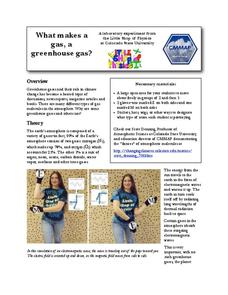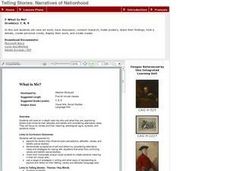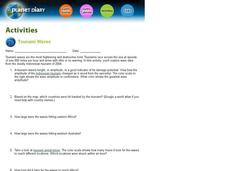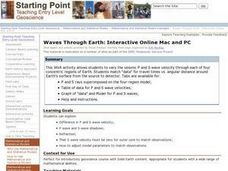Curated OER
Fall 2003 Midterm Exam #3
Let there be light! When your physics learners take this midterm exam, light will be their focus. They will show what they know about electromagnetic waves, interference, refraction, reflection, lenses, prisms, and more! The test is...
Curated OER
Sand Travels
Learners examine how sand is formed by erosion and that it can be moved by streams, rivers, and ocean currents in this unit of lessons. They study waves and currents, and structures that change how sand moves by creating story charts,...
Curated OER
Spectral Lines
Slides and slides of emission spectra bring this topic to light for your physics class! Exited electrons returning to lower energy levels is offered as the cause of emission spectra. In summary, viewers learn that we can determine the...
CK-12 Foundation
Least Time
What is the fastest way to get from point A to point B if you are going through two different mediums, such as air then water? Scholars explore the way light travels through air, water, acrylic, glass, and diamond as they answer this...
Curated OER
What Wavelength Was That?
A combination of informative text, photos, and graphics comprise this sharp show on electromagnetic radiation. Some slides mention hands-on activities for demonstrating concepts, so if you want to include them you will need to figure out...
Colorado State University
What Makes a Gas, a Greenhouse Gas?—The Carbon Dioxide Dance
Investigate a heated topic in environmental science. Scholars team up to play the parts of gas molecules in the atmosphere. As the teacher moves about, acting as the electromagnetic wave, learners react as their molecules would to the...
Smithsonian Institution
What's the Code? Coding Robot Movements Using Sound
Tap into the desire to learn about computer codes. Pupils apply the Tap Code and the Polybius Square to send secret codes using sound. They design a code that tells a robot what movements to make and then test out their code using one of...
Curated OER
The Bohr Model vs. the Wave Mechanical Model
In this Bohr model and wave mechanical model activity, students read about the differences between these two models of the atom. Students answer four questions about these models.
Curated OER
Waves
Students identify the different parts of a wave. In this physics lesson, students explain how animals communicate using sound waves. They discuss the effect of Navy's sonar on dolphins and whales.
Curated OER
What Is Me? Explore the Self through Names, Art and Symbols
Four lessons make up this unit on self. Learners research and discuss the significance of their given names and examine their perceptions of astrological signs and horoscopes. They explore objects in the paintings of Canadian artist...
Center Science Education
Feeling the Heat
What is an urban heat island? Middle school meteorologists find out by comparing temperatures at different locations on campus. They relate their findings to what might be happening in a concrete jungle and how it impacts local weather....
Curated OER
HW Unit 10:6-Standing Waves
In this standing waves worksheet, students answer 9 questions about graphs of various waves. They identify standing waves and their nodes, anti-nodes, wavelengths, amplitude, frequency and number of cycles.
Curated OER
Seismic Waves
Students identify the four types of seismic waves, their characteristics and effects. Then they predict the level of damage each wave might cause in a residential area and test their predictions against several computer animations. ...
Curated OER
Slinky Lab- Simulating the Motion of Earthquake Waves
Sixth graders simulate primary and secondary waves. In this earthquakes waves lesson, 6th graders experiment using a slinky to gain understanding of how waves are created during an earthquake. Students record observations in drawings....
Curated OER
Tsunami Waves
In this tsunami waves worksheet, students explore data from the Indonesian tsunami of 2004 and answer ten questions about the data. They draw conclusions about the devastation and destruction based on the amplitude and speed of the tsunami.
Curated OER
Wave Speed
In this waves worksheet, students use the equation for wave speed to calculate frequency or wavelength. This worksheet has 5 problems to solve.
Curated OER
Waves Worksheet #2
In this waves worksheet, students complete 7 fill in the blank questions regarding frequency, speed, amplitude and wavelength and how these properties relate to each other.
Curated OER
Wave Action
For this waves worksheet, students compare the characteristics of sound and light waves and determine the wavelength, amplitude, and speed of a wave. This worksheet has 9 problems to solve.
Curated OER
Waves Through Earth: Interactive Online Mac and PC
Students participate in a JAVA activity to vary the seismic P and S wave velocity through each of four concentric regions of Earth. They match "data" for travel times vs. angular distance around Earth's surface from the source to detector.
LABScI
Acoustics: The Sound Lab
If the delay between a sound and its echo is less than 1/10th of a second, the human ear can’t distinguish it. Through the use of a Slinky, rubber band guitar, and straws, scholars explore where sound comes from and how it travels....
Science Matters
Earthquakes and Volcanoes Post Assessment
The final lesson in the 20-part series is a post assessment covering earthquakes and volcanoes. Twenty-three questions incorporate each of the previous lessons through multiple choice, justified multiple choice, expanded multiple choice,...
DiscoverE
Slinky® Science
Toys are great for learning about physics. Scholars use Slinky® toys to study Newton's laws of motion and types of energy. After a little play, they then model longitudinal and transverse waves with the Slinky® toys.
Scholastic
Study Jams! Earthquakes
Have a seismic moment with your class as you show this animated video on earthquakes. Viewers find that quakes occur on faults and are caused by shifting of continental plates. They learn what properties are studied by seismologists and...
Next Generation Science Storylines
How Can We Sense so Many Different Sounds from a Distance?
Dive into the mystery of sound waves! Scholars brainstorm questions about how sound travels and why different items make different sounds. They then conduct experiments to answer their questions.























